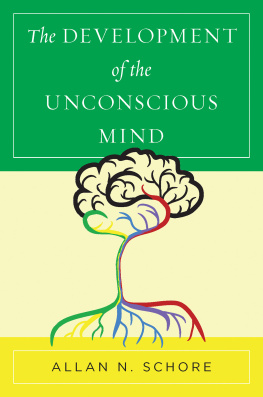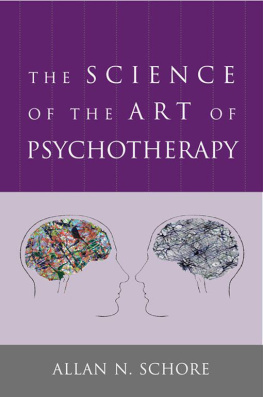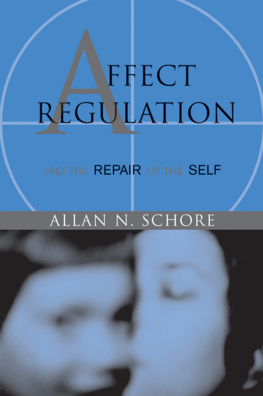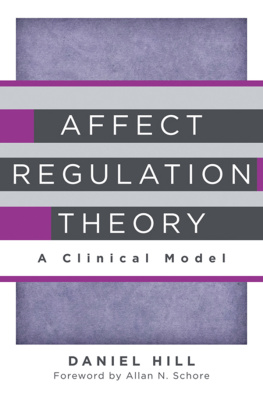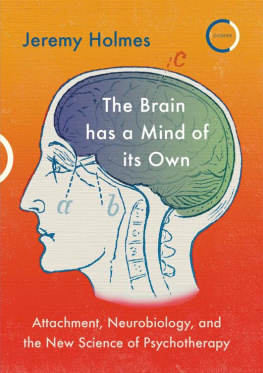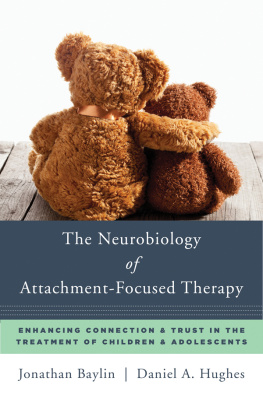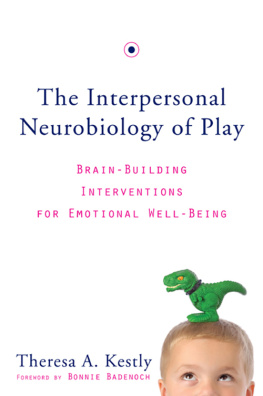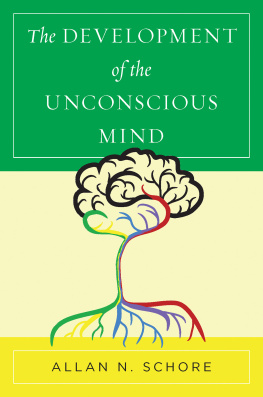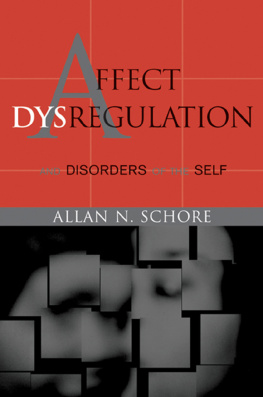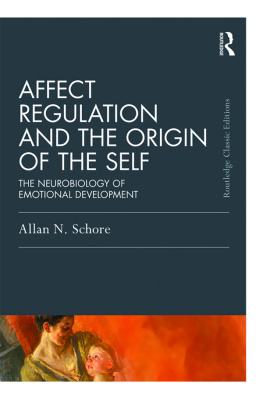Contents In Full

The Development of
the Unconscious Mind
The Norton Series on Interpersonal Neurobiology
Louis Cozolino, PhD, Series Editor
Allan N. Schore, PhD, Series Editor, 20072014
Daniel J. Siegel, MD, Founding Editor
The field of mental health is in a tremendously exciting period of growth and conceptual reorganization. Independent findings from a variety of scientific endeavors are converging in an interdisciplinary view of the mind and mental well-being. An interpersonal neurobiology of human development enables us to understand that the structure and function of the mind and brain are shaped by experiences, especially those involving emotional relationships.
The Norton Series on Interpersonal Neurobiology provides cutting-edge, multidisciplinary views that further our understanding of the complex neurobiology of the human mind. By drawing on a wide range of traditionally independent fields of researchsuch as neurobiology, genetics, memory, attachment, complex systems, anthropology, and evolutionary psychologythese texts offer mental health professionals a review and synthesis of scientific findings often inaccessible to clinicians. The books advance our understanding of human experience by finding the unity of knowledge, or consilience, that emerges with the translation of findings from numerous domains of study into a common language and conceptual framework. The series integrates the best of modern science with the healing art of psychotherapy.
The Development of
the Unconscious Mind
ALLAN N. SCHORE

W. W. Norton & Company
Independent Publishers Since 1923
New York London
A NORTON PROFESSIONAL BOOK
Note to Readers: Standards of clinical practice and protocol change over time, and no technique or recommendation is guaranteed to be safe or effective in all circumstances. This volume is intended as a general information resource for professionals practicing in the field of psychotherapy and mental health; it is not a substitute for appropriate training, peer review, and/or clinical supervision. Neither the publisher nor the author(s) can guarantee the complete accuracy, efficacy, or appropriateness of any particular recommendation in every respect.
Copyright 2019 by Allan N. Schore
All rights reserved
First Edition
For information about permission to reproduce selections from this book, write to Permissions, W. W. Norton & Company, Inc., 500 Fifth Avenue, New York, NY 10110
For information about special discounts for bulk purchases, please contact
W. W. Norton Special Sales at specialsales@wwnorton.com or 800-233-4830
Jacket design by Sally Rinehart
Cover illustration by Beth Schore
Author photograph by Beth Schore
Production manager: Katelyn MacKenzie
The Library of Congress has cataloged the printed edition as follows:
ISBN: 978-0-393-71291-9
ISBN: 978-0-393-71292-6 (ebk.)
W. W. Norton & Company, Inc., 500 Fifth Avenue, New York, N.Y. 10110
www.wwnorton.com
W. W. Norton & Company Ltd., 15 Carlisle Street, London W1D 3BS
The conscious mind may be compared to a fountain playing in the sun and falling back into the great subterranean pool of the subconscious from which it rises.
Sigmund Freud
Mans task is to become conscious of the contents that process upward from the unconscious his destiny is to create more and more consciousness.
Carl Jung
To all our children
I N 1994, I overviewed twentieth century developmental science to offer my first book Affect Regulation and the Origin of the Self. In the opening sentence of that volume, now published as a Classic Edition, I boldly asserted that the understanding of early development is one of the fundamental objectives of science. The beginnings of living systems set the stage for every aspect of an organisms internal and external functioning throughout the life span. In that inaugural volume of regulation theory, as well as three that followed, I articulated and elaborated the interpersonal neurobiological thesis that runs throughout my work: that events occurring during human infancy, especially emotional transactions with the social environment, are indelibly imprinted into the brain structures that are maturing in the first years of life. This book and its companion, Right Brain Psychotherapy, further expand regulation theory and continue to delve, deeply and widely, into a number of essential brain/mind/body functions, all operating at levels beneath conscious awareness, that are central to the human condition.
Since my 2012 volume, The Science of the Art of Psychotherapy, I continue to write, research, lecture, and share my work with audiences around the world. I take great pride in the fact that my publications over a variety of disciplines have increased to now well over 20,000 citations in Google Scholar. In my global travels over the past decade, I have also been very interested in finding new authors for the rapidly expanding field of interpersonal neurobiology. More times than not these individuals have sought me out, and many have actively participated in my Study Groups, which have spanned from Los Angeles and Vancouver to Boulder and Melbourne. Even more so than before I spend time mentoring individuals in a number of disciplines, especially mental health professionals who are adept at integrating science and clinical work, describing the coupling between biological and psychological processes, and combining an objective perspective with one steeped in bodily-based emotional subjectivity. Indeed, these mentoring efforts are in part reflected in the forewords Ive written for a number of Norton authors.
I would like to express my gratefulness to a group of remarkable conference organizers who have sponsored a number of important national and international personal appearances, including Marion Solomon, Jane Ryan, Joe Tucci, Ravi Kumar, Alessandro Carmelita, and Dan Hill. I also greatly value the contributions of my research partners, Ruth Lanius in Canada, and Jennifer Mcintosh and Craig Olsson in Australia. Id like to thank the Norton staff, especially Mariah Eppes and Sara McBride for the work theyve done on this book. Most notably, I express deep appreciation to my publisher and valued colleague Deborah Malmud for not only two decades of a productive and gratifying business and personal relationship, but for her continual advocacy of not only my work but the Norton Series.
Once again, I offer my love and gratitude to family: to David, for his professional computer skills; to Beth, for her talents in computer graphics and the design for the cover and a number of illustrations within this book; and to Judy, for providing so many forms of essential support for my lifes work. The words I wrote to her in my first book twenty-five years ago still ring true: Through her intellectual keenness and emotional honesty, she continues to reflect and reveal to me those essential reciprocal emotional processes that are, willingly and unwillingly, most clearly exposed in an intimate human relationship.
I N RECENT YEARS THE UNCONSCIOUS , the central theoretical construct of psychodynamic theory, has reappeared in a new form in the scientific and clinical literatures. Psychoanalysis has been called the scientific study of the unconscious mind (Brenner, 1980), clearly implying both that the unconscious is its definitional realm of study and that this realm is accessible to scientific analysis. Although originally closely tied to the psychoanalytic theory of repression, the construct of the unconscious is now being used across a number of psychological and neurobiological disciplines to describe essential implicit, spontaneous, rapid, and involuntary processes that act beneath levels of conscious awareness. Yet, despite current significant advances in brain laterality research, many clinicians and social scientists continue to hold older and now unsupported ideas that the primitive nonverbal unconscious mind is a miniature of the more complex verbal conscious mind, and that the nondominant right hemisphere is a lesser mirror of the dominant left hemisphere.

